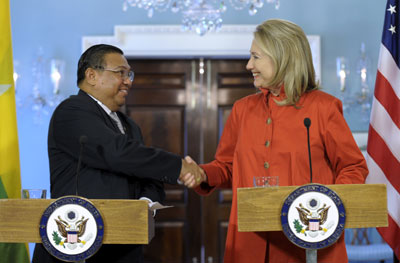On Thursday, the United States rolled back prohibitions against American companies doing business in Burma. The announcement marked the latest diplomatic reward given to President Thein Sein’s quasi-civilian government for initiating reforms in what has historically been a military-run country. In making the announcement, U.S. Secretary of State Hillary Clinton said the democratic changes initiated so far were “irreversible,” but that is a characterization few of the country’s journalists would share.
The government has flip-flopped on media regulations in the past few days, a troubling indicator that there might be no media policy at all in place. First, the official version: The government-owned newspaper and website published by the Ministry of Information, New Light of Myanmar, reported that Information Minister Kyaw Hsan met with several journalists and writers’ groups earlier in the week, pledging to “cooperate fully” with all the associations as the ministry drafts a “print media law, gradually but systematically releasing the grip over press in order that journalists can practice in harmony with that law after its ratification.” The government has also said it plans to get a new media law through parliament in the coming months. But that doesn’t mean there will be no censorship. After the government forms a press council, publications will be allowed to go to press under what it calls a check-after-publish system, New Light of Myanmar reported. Under current conditions, all copy must be submitted to censors first, and then be printed and distributed.
The minister said the press council would eventually replace the government’s current censorship arm, the Press Scrutiny and Registration Division (PSRD), but the council would remain under his ministry’s control. The proposed regulations stipulated that the press council must ensure that journalists abide by the 1962 Printer and Publisher Registration Act and the Ministry of Information’s still-standing 12-point censorship policy.
That did not sit well with Burma’s press corps. The exile-run Irrawaddy news site reported on Thursday that three Burmese media groups–the Myanmar Journalists Association, the Myanmar Journalists Network and the Myanmar Journalists Union–objected to the proposed rules for the soon-to-be-created press council.
Then today, Friday, PSRD Deputy Director Tint Swe told journalists that they could “forget about” the three-page proposal for press council regulations that Kyaw Hsan had handed out earlier in the week, journalists who took part in that meeting told Irawaddy. The PSRD will not insist that the journalists and writers groups follow the proposed regulations, they said.
That sort of U-turn raises questions about whether the government has thought out its approach to media, or if it is just dishing out edicts to see how they play in the eyes of the public and of the diplomats who control Burma’s integration into the global community.
During the transition from military to quasi-civilian rule, censorship has eased informally, especially over economic matters and the opposition led by pro-democracy icon Aung San Suu Kyi, but there are still no-go areas for local reporters. Newspapers do not report on the ongoing conflict with ethnic Kachin rebels in the country’s northern frontier. More recently, the PSRD banned reporting on the resignation of hard-line Vice President Tin Aung Myint Oo for apparent health reasons. And no local paper has dared to push boundaries by investigating and reporting on past abuses under the previous Than Shwe-led regime.
All the while, journalists remain under threat of the Printer and Publisher Registration Act that was implemented after military takeover and that allows for imprisonment for “harming the ideology and views” of the government. The vague and arbitrary Ministry of Informaton’s 12-point censorship policy still broadly bars any reporting on matters considered a threat to national unity or security.
Zaw Thet Htwe, a formerly jailed journalist and current organizing committee member of the Myanmar Journalists Union, told Irrawaddy that his group would not join the press council under the rules that, until today, had been the standing proposal. “Our union aims to protect freedom of expression and journalists’ rights, but based on the minister’s description of the Press Council’s role, we are reluctant to participate in it,” he told Irrawaddy. “I don’t think that the press council will be different from the old censorship board if it includes former members of the PSRD.”
Whether Friday’s U-turn was a genuine response to journalists’ concerns; or there is conflict between government officials or departments; or the left hand simply doesn’t know what the right hand is doing, the situation appears closer to chaos than to an earnest and measurable process of media reform. In announcing the removal of restrictions on U.S. companies investing in Burma, the White House acknowledged in a statement that Burma’s reforms are still “nascent” and that certain sanctions would remain in place as an “insurance policy.” That policy may yet come due.
